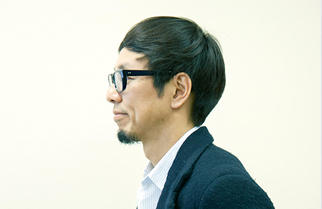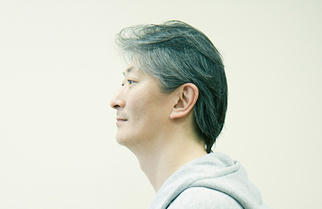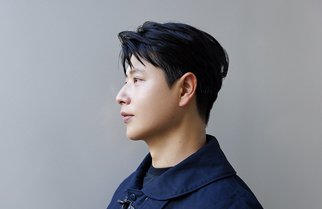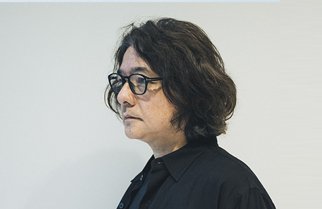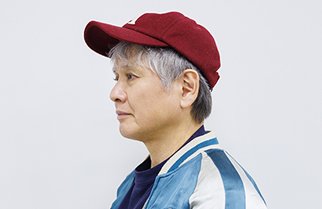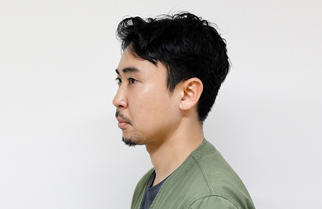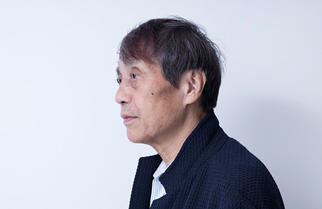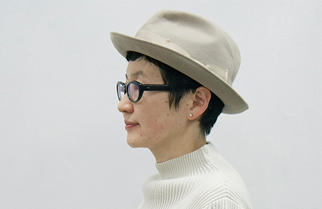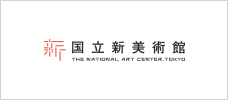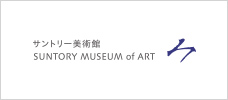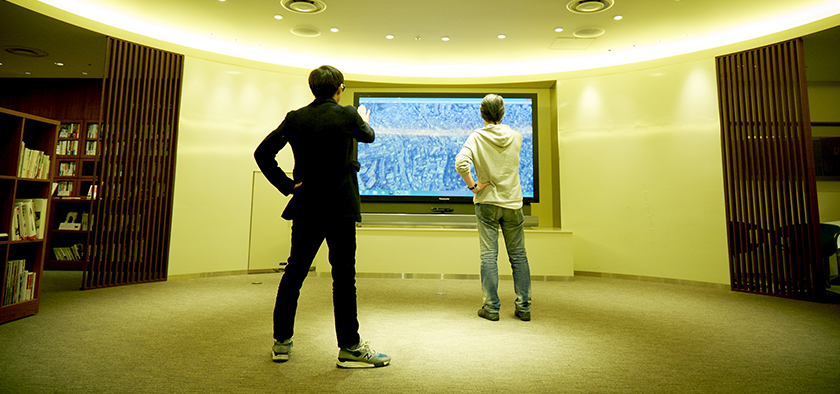
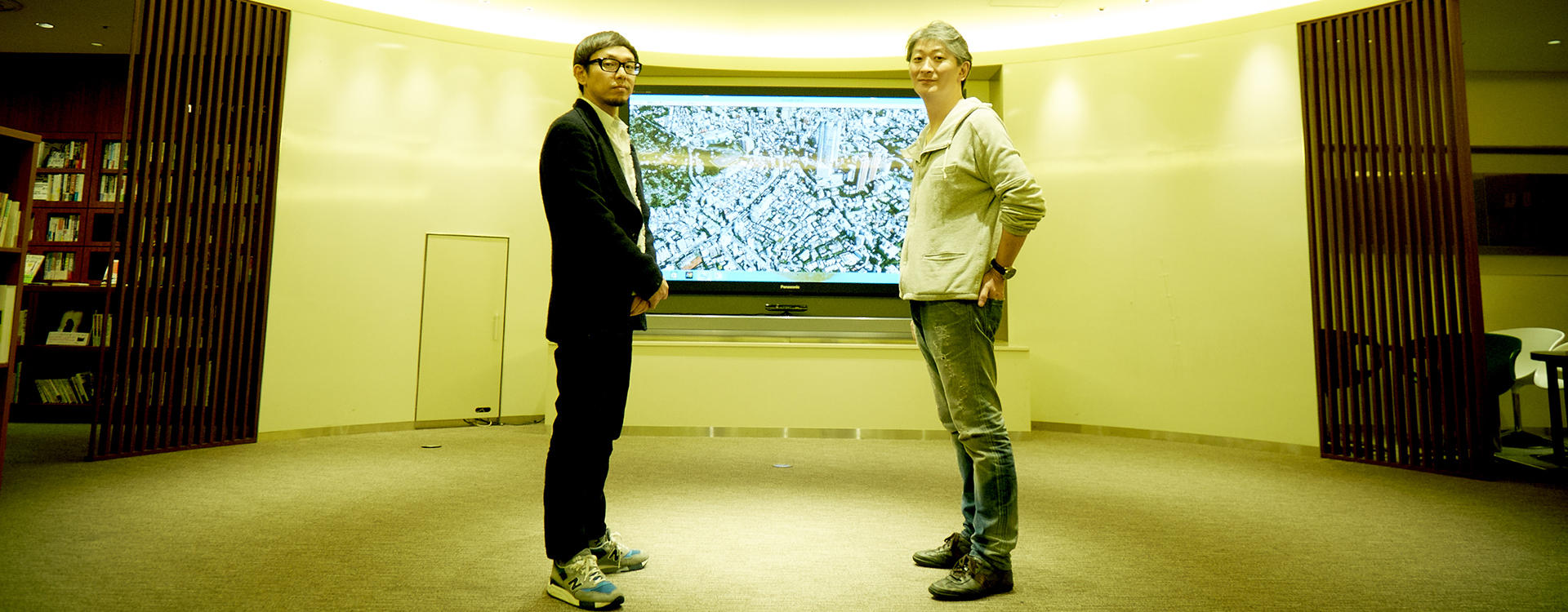
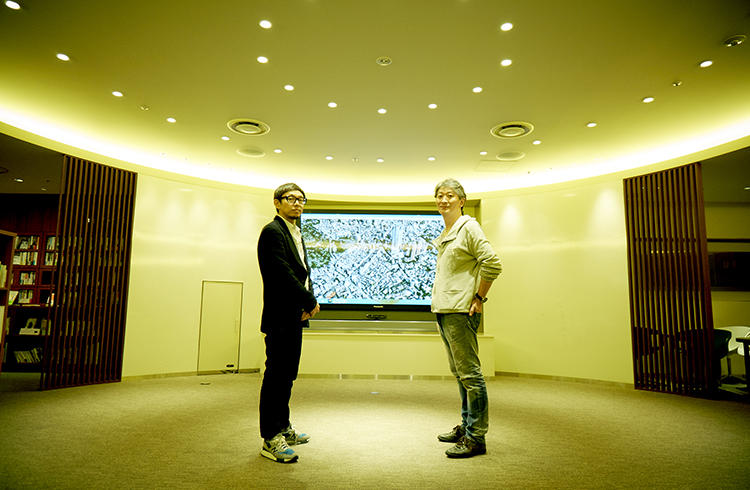
Perspectives from within and outside of Roppongi
Let's start a daily shuttle service between Roppongi and Kamakura Let's have a festival where everyone bring hometown food
Kayac CEO Daisuke Yanasawa and nomad CEO Osamu Ogasawara held a talk show recently in front of 50 readers of Roppongi Future Talks. Yanasawa's company is known for its unique style of management which includes determining the salaries of its employees by throwing dice. Ogasawara, who lives in Roppongi, is owner of the share office NOMAD NEW'S BASE and of the bar awabar, both of which are in Roppongi. Before the talk show, we had a photo session; the main photo for this article was taken at d-labo, a communication space in Tokyo Midtown.
Roppongi - a village made up of people from around the world
Daisuke Yanasawa When I set up Kayac 17 years ago, I decided to call it "Omoshiro hojin" (fun corporation) because I felt that people were going to work in a much more interesting way in the future. I also decided to have our headquarters in Kamakura, sensing that a time would come when it didn't matter where you worked. More companies are moving to the Kamakura area recently, and it seems that I'm finally getting to be understood.
Osamu Ogasawara I've constantly been changing jobs. I don't think I've stayed at any company for more than three years. My recent activities include investing in startup companies, setting up a facility called DMM.make in Akihabara, and selling robots. I've never been good at selling content, so I'm envious of Kayac. (laughs) I've always been involved in making the places and platforms for creating things.
Yanasawa The first time I came to Roppongi was when I was a high school student. I noticed there were a lot of foreigners. After Roppongi Hills and Tokyo Midtown were built, many IT offices seem to have cropped up in Roppongi and many of the people working in those places seem to reside here. That's the impression I have of Roppongi.
Ogasawara When I was asked to do this talk show, I asked, "Is it okay that I only know about the nightlife of Roppongi? (laughs) I'm from a different region as well, but Roppongi is made up of people from all over Japan and all over the world, and the community here is like a village. That's why it feels comfortable.
Working and playing near home
Ogasawara I decided to base my activities in Ropppongi because I wanted to go drinking as soon as I finished work. (laughs) Well, I actually did some serious thinking about this, and concluded that it's better if the places for work and play are close to home. You can feel more connected to the locale. There are quite a lot of people who work and play in the Roppongi area; they are referred to as people with "minatokubyo" (Minato ward illness). Shinjuku is seen as a place where people commute to, and Shibuya is the place to play for people who work there but who live a little further out in areas like Nakameguro. Roppongi is the most village-like of them all. Why did you base your company in Kamakura, Yanasawa-san?
Yanasawa For the simple reason that Kamakura has the sea and mountains. Before I set up Kayac, I worked at a company for about two years, and even as a "salaryman" I couldn't imagine myself working in a skyscraper office. I thought I should follow my instincts. It seemed better to do away with commuting time.
Ogasawara There are many high-rise buildings in Roppongi, but in the Nishi-Azabu area where we have our "NOMAD NEW'S BASE", there are quite a lot of low-rises. Though of course, there is no sea or mountains.
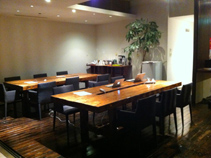
NOMAD NEW'S BASE
A share office building operated by nomad. Opened in December 2011, the three-story building has a café and workspaces as well as spaces where events and seminars can be held. There is patron membership system where members can support entrepreneurs.
Yanasawa Essentially, it didn't really matter where my company was based. I just chose Kamakura after contemplating what kind of company I wanted. What I had in mind was a company that was linked to the neighborhood, whose good performance would have positive effects for the region, and which in turn would make the employees happy.
It's possible to work anywhere now, so there are people who don't have headquarters. All the same, things like identity and roots are important for us humans, so I think we still need organizations and bases - places that are real and physical.
Kamacon Valley and awabar
Yanasawa We've recently started "Kamacon Valley" where we get together with people of other companies to vitalize the neighborhood. In the beginning, even the residents of Kamakura thought "Kamacon Valley" was something like Silicon Valley. The names might sound the same but our values are different. Three years have passed since its launch, and we've gained a lot more understanding.
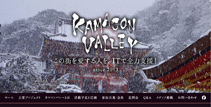
Kamacon Valley
A group consisting of more than 20 Kamakura-based companies including Kayac and people who are fond of Kamakura. The group aims to vitalize the town of Kamakura through IT projects such as crowdfunding. It also holds events such as experience-oriented tours of the historic city.
Ogasawara I have a small "tachinomiya" (a bar where people stand and drink) in Roppongi called awabar. I started it because staff at my company proposed setting up a tachinomiya that women would find easy to enter. The bar wasn't successful at first. But I didn't want it to close it down so I went to the bar every day and bought a drink for everyone who came. I continued doing this for a year. Acquaintances came over, taking pity on me, and they brought other people along with them.
I think people like the fact that while located in Roppongi, it's a bar where you can stand and drink for 500 yen and chat for 10-15 minutes. Roppongi is an interesting place for trying slightly different things. In Kamakura, there must also be shops and companies that are unique to the place.
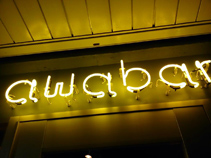
awabar
A bar that is a three-minute walk from Roppongi station. It provides drinks that have "awa" (bubbles) such as beer, champagne and sparkling wine. Since it opened in December 2010, it has become a popular gathering place, mainly for people working in the IT field.
Yanasawa It certainly seems that unique companies are increasingly coming to Kamakura. For example, there is Kamakura Toushin which invests only in the genuinely "good companies" and the Japanese branch of Patagonia which always donates 1% of its sales to an environmental organization. Kamakura seems to have an invisible, unexplainable appeal that draws companies to it.

The joy of mingling with people from different countries
Ogasawara It's as if there is a scale from 0 to 100 in Roppongi; there are people who have just started a company by themselves in one-room condominiums, while on the other hand, there are companies renting offices in places like Roppongi Hills and Tokyo Midtown. I think it's interesting that within a diameter of only about 2 kilometers, there is such a wide range of companies.
Yanasawa Roppongi has a diameter of only 2 km?
Ogasawara Maybe it's closer to about 1 km. Shinjuku and Shibuya are probably the only other places which have both one-person startup companies and companies with thousands of employees. Yesterday, at awabar, I met people from Finland, Germany, American and Britain, and they were all talking in Japanese. It's such a rare phenomenon to see people from five different countries talking in Japanese - a language spoken by a small population. I like situations like that where people of all races and backgrounds come together.
A little while ago, when we had the photo shoot and were asked to choose a city on the Google map that felt closest to the future, I chose Berlin. The way things are mixed together in that city intrigues me. Berlin is also near East Europe, and it's a place where you can witness meticulous German production technology as well as the economic gap between East and West. Berlin is vibrant as if something new is about to be born there.
Yanasawa Kayac currently has about 200 employees and roughly 20% are foreigners. Having employed people from different countries, I realize that the sense of humor differs by country. The Japanese for example, laugh at self-deprecatory jokes but apparently from a global viewpoint, such jokes are not common. People from Indonesia seem to get [self-deprecatory jokes]. Of course, this is only my personal impression from observing staff at Kayac.
Ogasawara I suppose that in Europe, [self-deprecatory jokes] may be difficult.
Yanasawa Incidentally, about five or six years ago, we put up an advert in English on a website for engineers calling for amazing engineers. We got applications from people from all over Europe with impressing backgrounds - people who said they had worked at NASA or had the ability to make robots. But you know, most of them were... exaggerating. (laughs)
The expected growth of digital production
Ogasawara I've been working in areas related to "monozukuri" (making things) recently. There's a lot of buzz about digital fabrication technology like 3D printers, but I've come to realize that "monozukuri" is not just about this kind of technology [but also about other factors]. Simply put, what has happened in the last 20 years is the development of the module. We can now buy a module, connect it and program it and get it working.
The other big advance is the development of social media like Facebook which has brought visibility. We can now ask questions like whether 500 items could be sold worldwide, or whether 100 could be sold to a certain group. Digital "monozukri" is definitely going to become widely popular in the way the Internet became popular. We're about to see a huge growth in this area, and I've placed myself right in the middle of it because I want to see what people are going to do.
Yanasawa A lot of activity is going on at DMM. make AKIBA. Do you think that this will continue and not be temporary boom?
Ogasawara It's likely to continue if one or two hit products are born. I chose Akiba (Akihabara) because it's a place where it's easy to explain things to people who come from abroad. Every location has its own color, so places like Roppongi and Shibuya would be compatible with software application and web services.
YanasawaAkiba is so famous, isn't it? In Kamakura, there are companies like "Kamakura Toushin" and "Kamakura Shirts" which take advantage of the good image of Kamakura.
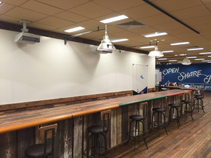
DMM.make AKIBA
A facility for making hardware which opened in Akihabara in November 2014. It has a "studio" equipped with the latest production machinery such as machine tools and testing equipment worth 5 million yen. There is also a "base" consisting of share offices and event spaces, and a "hub" that provides consultation services on hardware development.
Changing ourselves to enjoy the future
Yanasawa Of course I'm interested in the future, but I've never proposed trying to change the future. My approach is to change ourselves in order to enjoy the future. When you try to make interesting products, you naturally start doing things that haven't been done before, and that leads to the creation of new things.
The difficult part is to turning this into entertainment. In the world of art, there are cases where works are appreciated after the death of the artist. But we are looking to gain proper recognition in a shorter time span, while we are still alive.
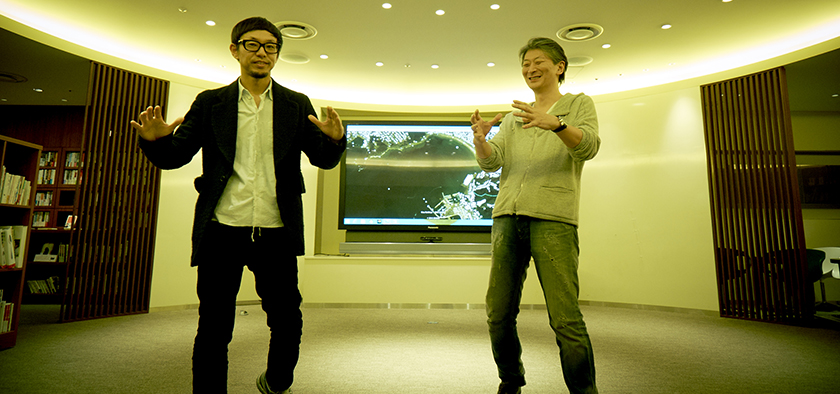
Moving to towns that fit one's lifestyle
Ogasawara Has the things that you and your company find interesting changed over time?
Yanasawa Yes. I think it's natural that our perspectives change according to the times. The theme for this talk show is about towns; I believe that in the future, people will be moving houses to places which fit their lifestyle. For example, when we are grandfathers and grandmothers, we will be moving to towns known to be the most comfortable towns for the elderly, and people with children will move to towns with good education. So towns will have to think about what kind of things they can offer people.
Ogasawara Towns will need to do that in order to survive.
Yanasawa The population in Japan is going to decrease from now on, and we're going to have a lot of redundant houses. And those changes will prompt the local governments to move. We're at a critical time, but I think it's also a time for opportunities.
A festival in Roppongi to savor food from 50-60 countries
Yanasawa Is there anything you would like to do in Roppongi?
Ogasawara I'd like to hold a "matsuri" (festival) at the place where the Azabu Police Station is scheduled to move to. In Roppongi, there are people from many different districts and countries, so it would be nice if everyone could bring an element of the festivals they experienced in their childhood.
Yanasawa So people from America would bring an American element and people from the Tohoku region will bring a Tohoku element.
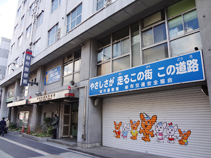
Azabu Police Station
A police station located halfway between the Roppongi intersection and Roppongi Hills. The building, constructed in 1972 has become old, and a new police station is scheduled to be built in Roppongi 4-chome at the former Mikawadai Junior High School site.
Ogasawara I think if we called on everybody, we could gather people from about 50-60 countries. There are many people from Africa and Turkey in the area encompassing Tokyo Midtown and the area opposite Roppongi Dori. And in the Roi Building where the clubs are, there are many hostesses. I think only a very few of the people living and working in Roppongi were born and raised in Tokyo.
In addition to helping with the matsuri, we could also ask everyone to bring food made in their hometowns. And if the food is popular, people could later open restaurants in Roppongi. If we could have that kind of event I'd be willing to make a small investment and put my energies into it. If the festival becomes an established event, I might be able to make some money. (laughs)
Making commuting time fun
Yanasawa A wonderful idea that is to be expected of an investor. I talked about commuting earlier, and this is something that I've been thinking about. How can we work without commuting? We could transfer ourselves though holographic technology as in "Star Wars". Or we could make commuting itself fun.
Ogasawara I see.
Yanasawa The trains and taxis we have now aren't that fun, so we could make special cars or buses that travel between Kamakura and Roppongi and in which passengers spend time pleasantly. We could have a bus stop in a remote place in Roppongi for buses that go directly to Kamakura. There would be two roundtrips every day. I would pay the transportation fees if there was such a service. (laughs)
Ogasawara I just remembered that there was a time when I drank till four in the morning, and together with the girl from the bar, I went to Shichirigahama (a beach in Kamakura) to have breakfast at Bills. (laughs)
Yanasawa So you had the world's best breakfast. That's just the kind of thing I'm talking about!
Ogasawara I think if we started a bus service leaving Roppongi early in the morning for breakfast at Bills, some people would be interested. There's some potential in that.
Yanasawa I think so too. Instead of the usual late-night bus, it would be fun to have buses that daily connect the most unexpected places. There are businesses nowadays which are doing well doing the most unexpected things. Such are the times we are living in. Of course, it's the Internet and social media which are helping to make such businesses possible.
Ogasawara And after all, Kamakura has the sea and mountains which Roppongi does not have.
Yanasawa Naoshima island has become an island of art because Soichiro Fukutake-san of Benesse personally funded it. I think that if we talked about a plan for a bus connecting Roppongi and Kamakura, some people will come up and offer to help, saying generous things like, "I will hire the driver!." (laughs)
Editor's thoughts
After the talk show, a Q&A session was held. In answering a question, Yanasawa-san notably said, "Things become more fun if instead of thinking about what the company can do for you, you think about what you would do if you were president of the company. It's the same when thinking about towns; you can't become fond of a town or have fun if you keep looking at towns from the perspective of how trendy or convenient they are." A memorable comment by Ogasawara-san was: "I'm fantasizing about the future and wondering if there is going to be a time when it would be normal not to work, and work will be something done by only an elite group of aristocratic people."(edit_kentaro inoue)




